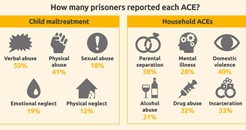 More than eight in ten men in prison suffered childhood adversity
More than eight in ten men in prison suffered childhood adversity
From an article by Public Health Wales
Between February and June 2018, a Prisoner ACE Survey was conducted by Public Health Wales and Bangor University using face-to-face interviews with 468 18-69 year old men in HM Prison Parc, Bridgend, South Wales.
More than 8 in 10 (84 per cent) said they had experienced at least one Adverse Childhood Experience (ACE) compared with a Welsh average of 46%.
Nearly half of prisoners (46%) reported they had experienced four or more ACEs. This compares to just over 1 in 10 (12%) in the wider population.
The report also found that prisoners with multiple ACEs (four or more) were four times more likely to have spent time in a young offender institution than those with no ACEs.
ACEs are traumatic experiences that occur before the age of 18. They range from child verbal, mental, physical and sexual abuse, to being exposed to alcoholism, drug use and domestic violence at home.
Top reported ACEs:
-
Parental separation 58%
-
Verbal abuse 51%
-
Physical abuse 41%
-
Domestic violence 40%
-
Incarceration 33%
-
Drug abuse 32%
-
Alcohol abuse 31%
-
Mental illness 28%
-
Emotional neglect 19%
-
Sexual abuse 18%
-
Physical neglect 12%
Children who experience ACEs are more likely to adopt health-harming and anti-social behaviours as adults, are at much greater risk of poor health throughout life, and may have greater needs for support from healthcare and other public services.
Dr Kat Ford, lead author of the report at Bangor University, said, “Nearly half of prisoners had experienced high levels of ACEs such as abuse, neglect and domestic violence in their childhood – levels much higher than observed in populations outside of prison. Amongst prisoners we found that having spent time in a young offender institution and having a history of prolific offending or violent offences were all linked with even higher levels of ACEs. These relationships add weight to the need for prisons to offer trauma-informed services to help ensure that those with ACEs are appropriately supported and are not re-traumatised when incarcerated.”
Professor Mark Bellis, Director of Policy and International Development for Public Health Wales, commented, “A third of all prisoners surveyed reported one of their adverse childhood experiences was growing up in a household where someone had been incarcerated. These intergenerational cycles can be broken through health and criminal justice systems working together and helping parents provide a safe and nurturing environment for every child.”
Janet Wallsgrove, Director of HMP & YOI Parc, said: "Shining a light on the negative impact of ACEs in later life is crucial as it allows us to provide the right rehabilitative support for the men in our care."
Other findings from the report include that, compared with prisoners with no ACEs, those with four or more were:
-
Four times more likely to have ever been convicted of criminal damage
-
Three times more likely to have ever been convicted of violence against the person
-
Three times more likely to have ever been convicted of theft
-
Twice as likely to have ever been convicted of drugs offences
Read the full article here.
So much pain. What can the Church do to 'help parents provide a safe and nurturing environment for every child'? Notice also the emphasis in the report on abuse, etc but not parental separation - the most experienced ACE. Family breakdown has such long-term consequences and yet we do not address this?
Retweet about this article:
From an article by Public Health Wales, 15/05/2019